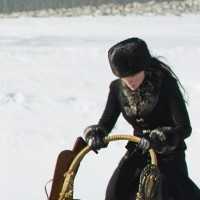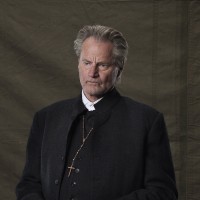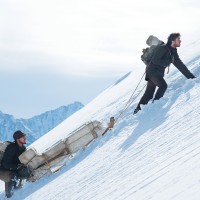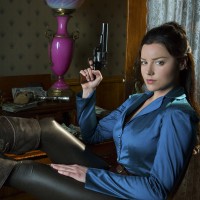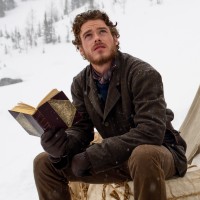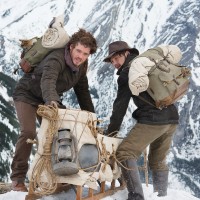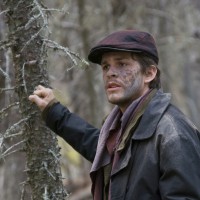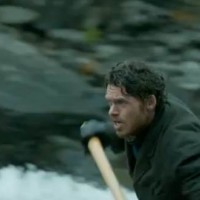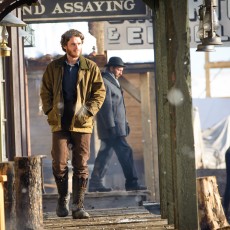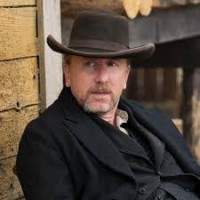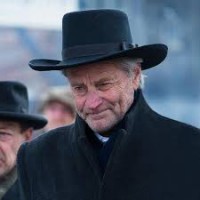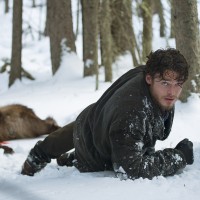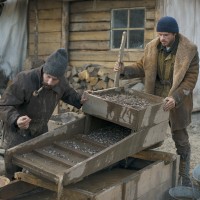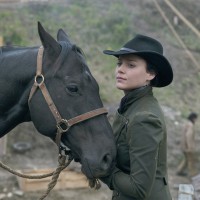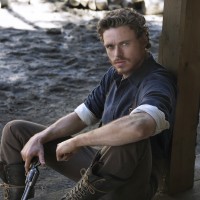Q&A Interview with KLONDIKE Stars Richard Madden, Abbie Cornish and More, Plus Director, Writer, EPs
Maj Canton - January 20, 2014
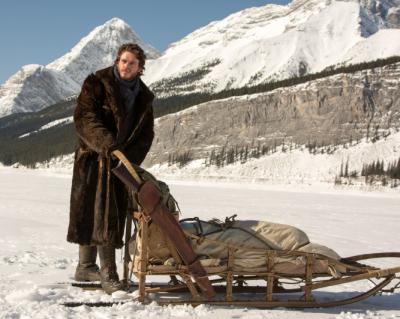
Last week at the Television Critics Association (TCA) Winter Press Tour, Discovery presented a KLONDIKE press panel that included stars Richard Madden, Abbie Cornish, Sam Shepard, Tim Roth, Johnny Simmons, Conor Leslie, and Augustus Prew; director Simon Cellan Jones; lead writer Paul Scheuring; and executive producers David Zucker from Scott Free Productions and Discovery's Dolores Gavin. The panel dished about the lives of gold miners in the 1890s in Alaska; revealed on-set anecdotes about filming dangerous scenes with dogs, rapids, and avalanches; and discussed what fascinated them about the characters and how they prepared for their roles.
Based on the book "Gold Diggers: Striking It Rich in the Klondike" by Charlotte Gray, KLONDIKE is a part-fact/part-fiction adventure story that tells the tale of seven strangers and their collective fight for survival and wealth in a small, frontier town in the Yukon territory in 1897 during the last great Gold Rush in history. Filmed in Alberta, Canada, the cast and crew spent 56 days at 9,000-feet above sea level -- above the cloud cover -- with temperatures that dropped to almost 30 below zero for 16 hours straight, as they also endured dangerous raging rapids and real avalanches while filming scenes for this three-part miniseries.
KLONDIKE airs 9pm ET/PT tonight (Jan. 20), tomorrow (Jan. 21) and Wednesday (Jan. 22) on Discovery.
|
|
|
|
Question: Can you discuss how you prepared for these roles? Abbie Cornish: Something that really struck us very early on, I think, is that the environment that we were in really formed the environment that these characters would have been in at the time -- not to the same degree, obviously. We shot in Calgary and we started off in the winter. For both Richard and me, the first couple of days on set, we were on a massive lake. It was cold. There was snow being thrown into snow machines. Richard spent the whole day with real snow being blown into his face. Hands were cold. The face was cold. It was hard to talk. There was something very elemental, very challenging, and very dramatic about the landscape and about the weather that told us very quickly what these characters would have felt like and gave us a little sense and a little taste of it. So that, for us, was a really wonderful thing that we didn't expect to have happen because you can research for days through text, and there was a lot of information for [their characters] Bill Haskell and Belinda Mulroney. We were really lucky. We're both nerdy, in that, we enjoy the process of gathering information. Johnny was very much like that about Jack London, and so it was kind of nice to have something physical come in and really take over as well. |
|
Richard Madden: There's so many photographs from the time that informed us so much in terms of the costume and what they were actually wearing that we could do it quite realistically and dress exactly how they would have done, which was really miserable a lot of the time, actually, because it was freezing. |
|
|
|
|
|
|
|
Question: Paul, what it is like writing dialogue for Sam Shepard and knowing that Sam Shepard is going to be reading your dialogue? Paul Scheuring: [Laughter] Well, I think the saving grace to that question is that I wrote it before I knew he was going to be Judge, right? So it's easy to write very boldly in a vacuum. It's when he shows up on set, and Sam came in to replace Chris Cooper, who had suffered a minor heart attack, who had originally been cast in the role, and he'd come in pretty late into the process. He was a very willing kind of a collaborator, and he had his thoughts, certainly, about some scenes and contributed. So it was obviously an honor. It's the great Sam Shepard. |
|
|
|
|
Question: Sam, could you talk about the difficulties of keeping your writing hat on or taking your writing hat off when you're reading someone else's dialogue and you're just an actor on the set? Sam Shepard: Well, the hats look exactly the same. There's no difference between the writing hat and the acting hat.
Question: Sam, why do you think TV audiences have recently been fascinated by Alaska, the Last Frontier, and things out in the distance? Sam Shepard: Well, the exterior course is different, but I see this just as another piece of American madness. It's just another chunk of the insanity that we carry around with us, regardless of whether we're involved in technology or if we're involved in trapping beavers. |
|
|
|
|
Question: Is it still true that the rest of the world is fascinated by odd parts of the American frontier? Abbie Cornish: As an Australian, I can say for sure. I think all of that stuff is fascinating. As an Australian, the history of America mirrors things that happened in Australia. So there's a fascination there as well, but I think America being as loud and as present in the world as it is, that its history is very fascinating. |
|
|
|
|
Question: Paul, why did you fictionalize some characters rather than use real figures? Paul Scheuring: Well, the source material is a book that Ridley Scott's company had an option on called "Gold Diggers" by Charlotte Gray, and she had chronicled five or six different characters following them up through the Klondike gold rush. I thought she did such a marvelous job of kind of fleshing out Belinda Mulroney and Jack London and Bill Haskell and the various characters that that was really easy to make kind of the central part of the narrative. More supplementary characters, like Epstein or Sabine (pictured on left), I created to serve the larger narrative. One thing that keeps Bill Haskell in the Klondike is that he has some unfinished business in terms of the mystery of his murdered friend, because if our main characters' only goal was to go up there and get rich that was not something that the audience would embrace and empathize with for very long. So we had to cause a great pain to his soul. So that was kind of why I created the Epstein character. |
|
Paul Scheuring (cont): There were not a lot of women in the narrative in terms of the book. So in creating Sabine, she was kind of a counterpoint to Belinda. Belinda was such an interesting character to me because in 1897 for a woman to go that far away and to set up a shop to become an entrepreneur was such a bold thing. The interesting thing about the source material was that she actually became the godfather of the town. She became the most powerful person in Dawson City. I didn't make that up. And that may be the central reason I committed to the project initially, because I thought what kind of woman has that kind of moxie to be able to go up there and dominate effectively, at least economically, all these men? But then I thought, are we going to show all women in that light? And I thought, you know, under the great truth up there that, because of chauvinism and because of the economics of the kind of environment, women were obviously also courtesans. And so I wanted to explore that as well, and it allows a feminine arc in a character to go from this place of self loathing, of prostitution, to maybe there's some hope of deliverance for me, which is service, which is to forego my old ways because, in a lot of ways, what I wanted in a lot of the characters. Ultimately, this isn't about gold; it's about the kind of the arc of their souls and can they find deliverance in this horrid place.
Question: Were there Jewish prospectors? [Laughter] Was there actually anybody like Epstein? Paul Scheuring: There was across the board. What was really interesting in the research was that you had Russians, you had Chinese. It was not just a North American phenomena. So I'll let you into a little of my thinking in terms of the creation of the Epstein character, which was that we needed to have a character who gets murdered who could have a number of different motives behind that murder. One of them I felt was a very simple one at that time, which was prejudice. And candidly, the very first thought I had was that Epstein was black. His name, of course, would not have been Epstein, but then I thought that might stick out a little too much. So let's take it down just a step, and let's make it Epstein and the bias that people have is anti Semitism. So, candidly, that was really the way I made the choice to make him Jewish. But, again, it's not out of keeping in terms of the cross section of people that were up there. |
|
|
|
|
|
Question: Dolores, KLONDIKE is Discovery's first miniseries. Why did you want to launch with this subject? Dolores Gavin: Well, about three years ago, we had a pretty simple conversation at headquarters, and we just started by saying, "Okay, what are the stories we haven't told?" We have a very successful track record in the reality space with GOLD RUSH, but we said, "What about the real gold rush?" Because the truth is that, at the core of who we are at Discovery, Discovery is about man's relationship to nature and, sometimes, that's a beautiful relationship and, sometimes, that's an agonizing relationship. In the end, it's always a meaningful one. |
|
Question: Did the HATFIELDS & MCCOYS have anything to do with the decision to pursue scripted material? Dolores Gavin: I think, certainly HATFIELDS & MCCOYS that stands on its own, but I do think that at Discovery it was something that was under discussion. Every day we go into each other's offices and say to each other, "What do we want to do? Can we do a live program? Can we have someone walk across the Grand Canyon while he doesn't have a tether?" So every single day, we have these types of conversations. So I think it was Eileen and I with Edward Sabin and a few of the other key players who just said, "You know, we're going to just try this, and we're going to take this to David Zaslav," and he was magnificent. He was very, very tough on us, and a number of times before he said yes, he said no. And, of course, he pushed us to the point where he was saying, "Is this the one? Is this the one?" And we said, "Yes, this is the one," and we were going back and forth. It was very emotional. And he said, "Okay. Let's do it. Talk to you later," and hangs up the phone. And at that moment, we're going, "What do we do?" It was exhilarating and scary and all those things kind of wrapped up into one. It was a great moment, and then we started the journey. The goal is to continue to tell these stories, and we certainly hope that people will respond to this one, and we'll kind of go from there.
Question: Is there a plan to have a sequel to KLONDIKE?
Question: You mentioned saying good bye to KLONDIKE and finding more stories. Can you detail perhaps some of what you're working on in the scripted realm going forward? |
|
|
|
|
|
Question: We grew up knowing a lot about the California gold rush in America, but this story I think is probably under told. Would you agree? Abbie Cornish: Simon? [Laughter] Simon Cellan Jones: Yeah, I think the story is so sort of brutal. We've got so many stories about the California gold rush, which had many sort of similar economic and sort of migration factors. But added to this, you had to really mean it. One of the characters says, "You've got to go as far as you can go and then just keep going," because it was so hard just to get there. Literally, you were locked in for six months a year by the winter. I'm just amazed that this story hasn't been told before properly, because it seems to me the heart of what makes America both good and bad and crazy, as Sam was saying. I think it was a story just ripe for plucking, and I'm so glad that Dolores and David and Paul grabbed it. |
|
|
|
|
Question: Johnny, how did you prepare to play Jack London, a very famous writer? Johnny Simmons: Well, I read a lot of his books, and my favorite was "Martin Eden." "Martin Eden" tells the story of what happened to Jack London after he came back from the Klondike. He dropped out of Berkeley. He packed up and left. He was on a search for his father. His father abandoned him, saying "You're not my son." He took off for the Klondike and ended up writing a bunch of his material off of his experience there. But the thing that I found the most interesting about him was "Martin Eden." He came back and pursued literary success and just reading a lot. There's so much information, his own biography is "John Barleycorn," and "Martin Eden" really let you in on his thoughts. Plus there's a bunch of biographies and just reading. |
|
|
|
|
Question: Richard, can you talk about doing the rapids scenes? The close ups, were they done in a tank? It looked very dangerous. Richard Madden: Yeah, it was dangerous. We did some tank stuff for the underwater stuff, but we actually had a camera in the water on the day we were doing that as well, and I did throw myself into the rapids. They were real rapids, and we were all kind of on speed boats trying to achieve something really difficult and mad. But it was brilliant. I think that's what is so good about this show is that we don't rely heavily on CGI or VFX for a lot of it. Most of it is we were actually there doing it. When we were up the mountains, we were at 9,000 feet. You drive into base in the morning and get into period costume, and then take a snowmobile as far up the mountain as you could. And then you'd hike 45 minutes to get to the top, which is like there's no air and you can't really breathe. And then we'd start shooting. |
| Richard Madden (cont): It was the same with the river rapids. Before I got there, I was like, "Oh, we're not actually using this are we?" [Laughter] "That's really dangerous." And then I just kind of convinced myself that it was a studio and we could just turn the rapids off if it got dangerous. [Laughter] It was the only way I was going to get in them. I remember being in the boat with Auggie, and we'd had a couple of scary moments -- actually, we've got lots of safety people there, but you can't control nature. I think the show talks about that, and we kind of experienced that firsthand. We smashed this boat into the rocks quite dangerously. Augustus Prew: Yeah. Richard Madden: There's actually some very funny sound recordings of Auggie's panic during that [Laughter], which was not an accent. Augustus Prew: Yeah, I was the only one left in the boat with about six pairs of oars. [Laughter] Paul Scheuring: If I could add onto that really quickly. That river was an Albertan river in April with the runoff from the mountains. That was a very cold river, and I was candidly shocked that these guys were willing to go out and do that because that was mostly shot practical, and most of the film was shot practical. And that's a testament to Simon because Simon came in and just said, "No, man. We're going to shoot it all handheld. It's all going to be real." David Zucker: And what countrymen will do for other countrymen. [Laughter] Paul Scheuring: But, you know, the last thing I would say there is that I'm just so profoundly proud of them for everything that they've been able to pull together because it was a 55-day shoot. That's roughly eight shooting days per hour [of finished video], which is effectively the shooting schedule for a courtroom drama. So basically, you're going to get a bunch of singles and close ups in a courtroom drama. The scope that you get in this picture in that very short time frame, to me, is really a miracle. And, again, that's a testament to the can-do kind of mentality of Simon and also the actors that were very willing to go to these places. Abbie's running across the frozen lake. There it is. Abbie's running across the frozen lake. They all ran their own dog teams. We're chasing them with helicopters. The lake is starting to crack because it's starting to melt, because the spring is coming. You'd hear these huge cracks that would kind of undermine the entire lake. It would be this guttural kind of roar of the earth going "Rrroar," and the whole film crew would stop for a minute and then start shooting again. [Laughter] So, in some ways it's kind of the magic of old-school filmmaking -- that epic filmmaking, because, we had to rely on a little CGI in certain places, but what you see is what you get here in this picture. I'm very grateful to Simon and to the actors and to the crew for being able to do that. |
|
|
|
|
|
Question: Was there any thought at all of actually shooting in Dawson City? Is the city like a standing set? Paul Scheuring: Well, Dawson still exists, and I believe it's about 2,000 or some people, but to call it a standing set, I think, is generous. There certainly are still a few historical pieces there, but it is more of a contemporary town. Also, in terms of getting crew in and out and all that stuff, ultimately, it just wasn't really viable, I don't think. |
|
Question: Well, why Calgary or Alberta then? Paul Scheuring: Well, it's like anything else with these productions. There's much algebra going into the actual decisions where to shoot in terms of what serves you creatively but also the deal makers and the tax incentives and all these different things come into play. And the people you partner with in terms of international distributors say, "Hey, look, we have this tax credit in this place." So you're synthesizing all these things when you're making that decision where you're ultimately going to shoot, and Alberta proved to be the best choice. I think creatively it bore out well for us. Question: Did you scout Dawson? It seems like you know a bit about it. Paul Scheuring: We did the ol' virtual scout. |
|
|
|
|
|
Question: Tim, do you do an elaborate backstory to justify how you behave when you play a villain? Tim Roth: No. [Laughter] No, I think originally it was German. |
|
|
|
|
Question: Sam, have your motivations changed as to why you take a role? Sam Shepard: Yeah. I was out of work. [Laughter]
Question: So this one was all about the money? |
|
David Zucker: And, actually, when we were pursuing Sam, even getting connected to him proved to be a challenge in and of itself, because we had collectively decided on a Friday to make an aggressive run to see if we could draft him into the picture, had conversations with his representatives. Then the question that wouldn't typically be considered a challenge in this day and age, "How are we going to get him the script?" for Sam proved to be a rather large ordeal because he was out fishing. So we couldn't get a hold of him directly. [Laughter] He didn't have Internet, so we couldn't e-mail him the script. We had to find a way to actually get contacted with the Kinkos so that we could have it printed and then the next morning when he's back from fishing, he could then pick it up. He read it. He called us. I think the other attraction perhaps is that he could get in his car, drive up to Calgary, do some work, and then go out and fish again. [Laughter] |
|
|
|
|
|
Question: Simon, what was the most difficult sequence to film? Simon Cellan Jones: I suppose the most difficult one was the scene with wolves chasing Richard, because the wolves were sort of like big fluffy pets who'd go and fetch your slippers for you. [Laughter] So it was very hard to make them aggressive. But I think the thing that was the most difficult or the most exciting was the big avalanche in the beginning of the first episode, and that involved blowing up huge amounts of snow and making it fall down the mountain. That was the most complex because we only had one chance at that, and we had to sort of shoot people running away from it and then use the same shots and actually have the snow coming down. If we got that wrong, we blew the whole movie. |
|
Paul Scheuring: And that's worth talking just a little bit more about because, again, you would think, "Hey, we don't have any time, let's just VFX that sequence." And Simon wanted to blow a palisade on the top of a ridge. So the funny part was they took us up there. We were at 9,000 feet, and we had a safety guy with us who worked those ridges. They would occasionally dynamite the ridges to avoid avalanches, and he was following us everywhere and treating us properly like a Hollywood film crew that didn't know what they were doing and cautioning, "Safety, safety, safety." And the big question was, "Can we dynamite that ridge like you do when you're relieving those pressures, and can we film it?" And he said, "Oh, yeah, yeah, yeah. I think we could probably put about 12 charges up there." And we said, "12 charges? Well, how much do you usually do?" And he says, "One." And we said, "What's the most you've ever done?" He said, "Four." So this guy was completely flying by the seat of his pants. The safety guy was the guy willing to go further than everybody else. So that day, we had 12 cameras out there, and we blew the ridge hoping -- and it was beautiful. I think two or three of those Go Pros [cameras] are still buried up there. |
|
|
|
|
|
Question: Paul, how amused are you about jokes regarding what one might do for a Klondike Bar? Paul Scheuring: Yeah, we heard that more than once. |
|
|
|
|
Question: Is it better to work on something like this where it's shorter and you can go off and do other things? Is there something that appeals to you with a miniseries rather than doing a full series? Abbie Cornish: It's up for the grabs, everybody. |
|
Abbie Cornish: This also didn't feel like television, to be really honest. Even though it was three episodes, I think for a lot of us, we never sat and segregated those episodes and compartmentalized it time-wise and journey-wise. It was one arc. It was one story that was being told from beginning to end. And it sort of felt they felt more like chapters in a book. And the way that it was shot, there was something about the way Simon and the art direction, it kind of had this momentum and a life to it that was very specific to it. It was very stylized, a lot of hand held shots. So there's a gritty, really contemporary feel to a period piece, which is very interesting and really beautifully stylized, I think. |
|
|
|
|
|
Question: Richard, you didn't have a happy life in GAME OF THRONES, and you didn't really have much good news in KLONDIKE. Is that what drove you to CINDERELLA? [Laughter] Richard Madden: Yeah, I was bored with being miserable. No. It drove me to CINDERELLA is a funny thing. |
|
|

